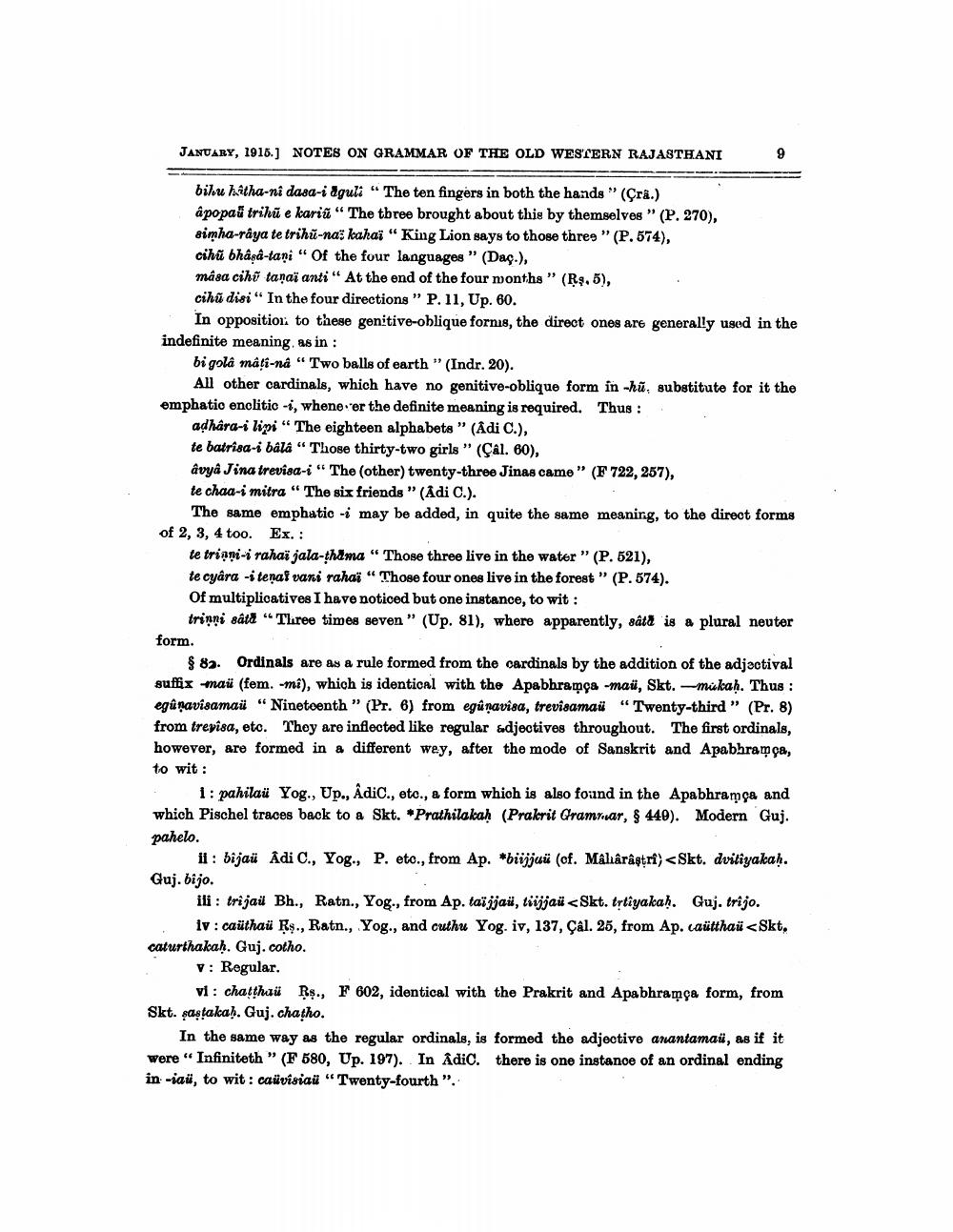________________
JANUARY, 1916.) NOTES ON GRAMMAR OF THE OLD WESTERN RAJASTHANI
bihu hatha-ni dasa-i dguli " The ten fingers in both the hands" (Fra.) apopau trihū e kariã " The three brought about this by themselves" (P. 270), simha-råya te trihū-naš kahaï "King Lion says to those three " (P.674), cihū bhâşâ-tani “Of the four languages" (Dac.), masa cihi tanai anti" At the end of the four months" (R9,5), cihã disi" In the four directions " P.11, Up. 60.
In opposition to these genitive-oblique fornis, the direct ones are generally used in the indefinite meaning, as in :
bi gola mati-na "Two balls of earth" (Indr. 20).
All other cardinals, which have no genitive-oblique form in -hū, substitute for it the emphatio enclitic -i, whene er the definite meaning is required. Thus:
adhâra-i lipi " The eighteen alphabets ” (Adi C.), te batrisa-i bála “ Those thirty-two girls" (Çal. 60), âvya Jina trevisa-i "The (other) twenty-three Jinas came" (F 722, 257), te chaa-i mitra “The six friends" (Adi C.).
The same emphatic - may be added, in quite the same meaning, to the direct forms of 2, 3, 4 too. Ex.:
te triani-i rahaï jala-thama "Those three live in the water" (P. 521), te cyâra -i tenaf vani rahaï " Those four ones live in the forest" (P. 574). Of multiplicatives I have noticed but one instance, to wit :
trinni sâta "Three times seven" (Up. 81), where apparently, sàta 'is a plural neuter form.
$ 82. Ordinals are as a rule formed from the cardinals by the addition of the adjactival suffix maü (fem.-mi), which is identical with the Apabhramga -mai, Skt. -mükah. Thus : egûnavisamai“ Ninetoenth" (Pr. 6) from egúnavisa, trevisamaü "Twenty-third” (Pr. 8) from trepisa, etc. They are inflected like regular adjectives throughout. The first ordinals, however, are formed in a different wey, after the mode of Sanskrit and Apabhraça, to wit :
i: pahilaü Yog., Up., Adic., etc., a form which is also found in the Apabhramça and which Pischel traces back to a Skt. *Prathilakah (Prakrit Grammar, $ 440). Modern Guj. pahelo.
il: bijaü Adi C., Yog., P. etc., from Ap. *biijjuü (cf. Mâlârâștri) <Skt. dvitiyakah. Guj. bijo.
ili: trijai Bh., Ratn., Yog., from Ap. taĉjjai, tiijjaü <Skt. trtiyakah. Guj. trijo.
iv: caüthaü Rs., Ratn., Yog., and cuthu Yog. iv, 137, Çal. 25, from Ap. caütthaü <Skt, caturthakah. Guj.cotho.
V: Regular.
vi : chatthali Rs., F 602, identical with the Prakrit and Apabhramça form, from Skt. sastaka). Guj.chatho.
In the same way as the regular ordinals, is formed the adjective arantamaü, as if it were" Infiniteth” (F 580, Up. 197). In Adic. there is one instance of an ordinal ending in -iaü, to wit: caüvisiaü "Twenty-fourth".




